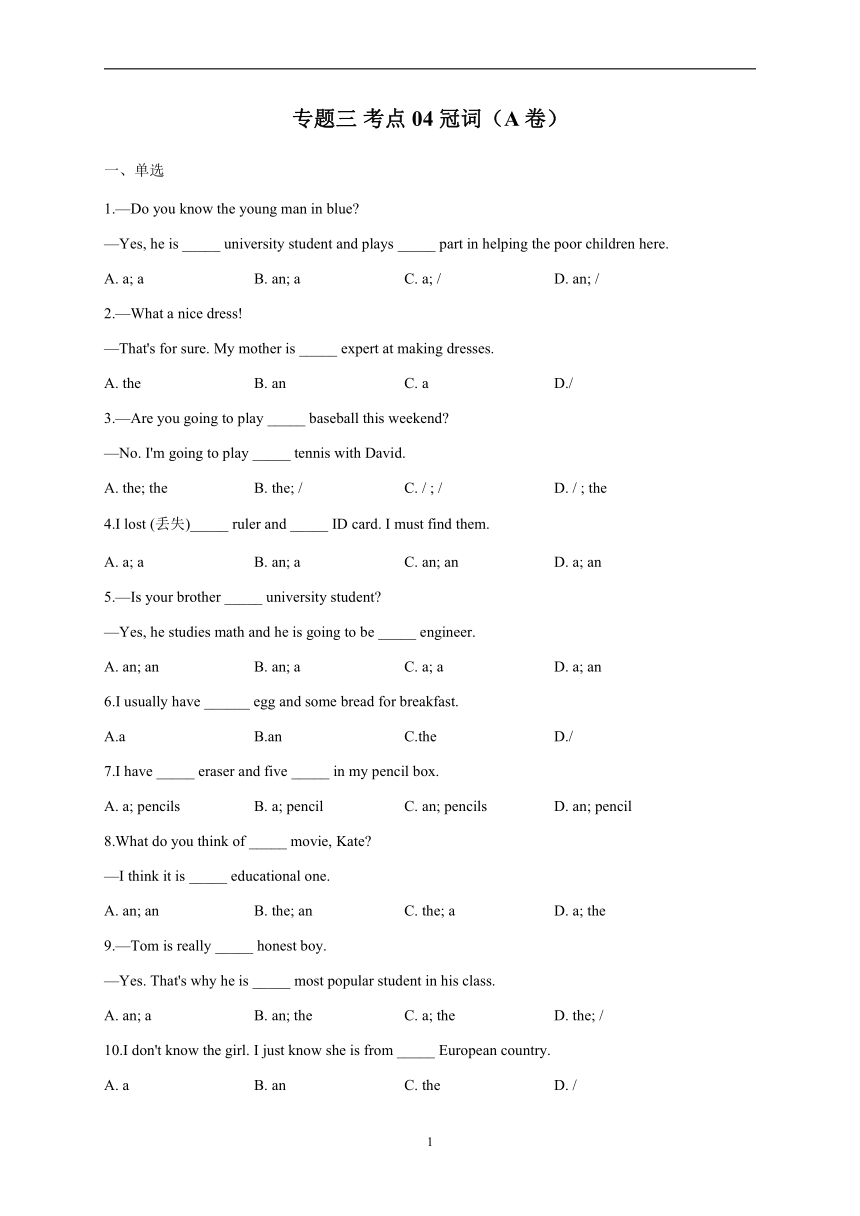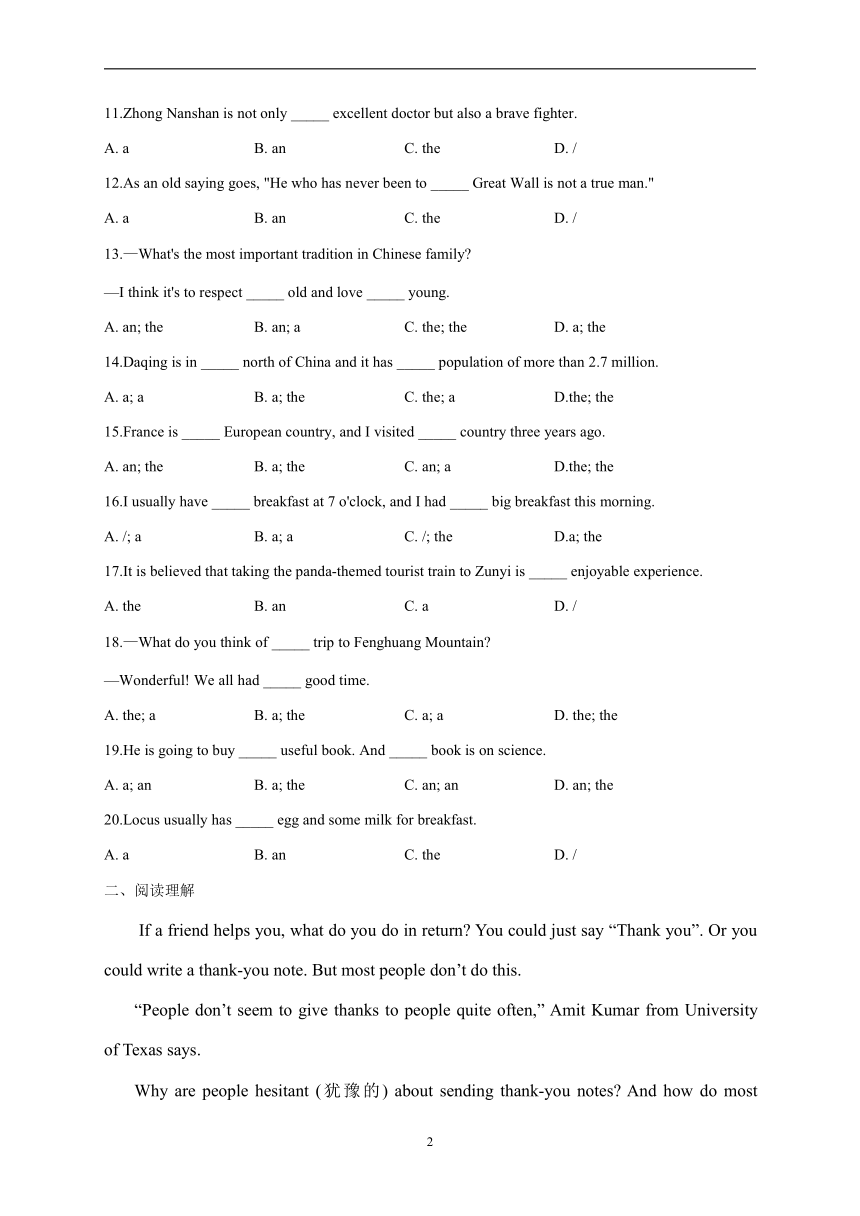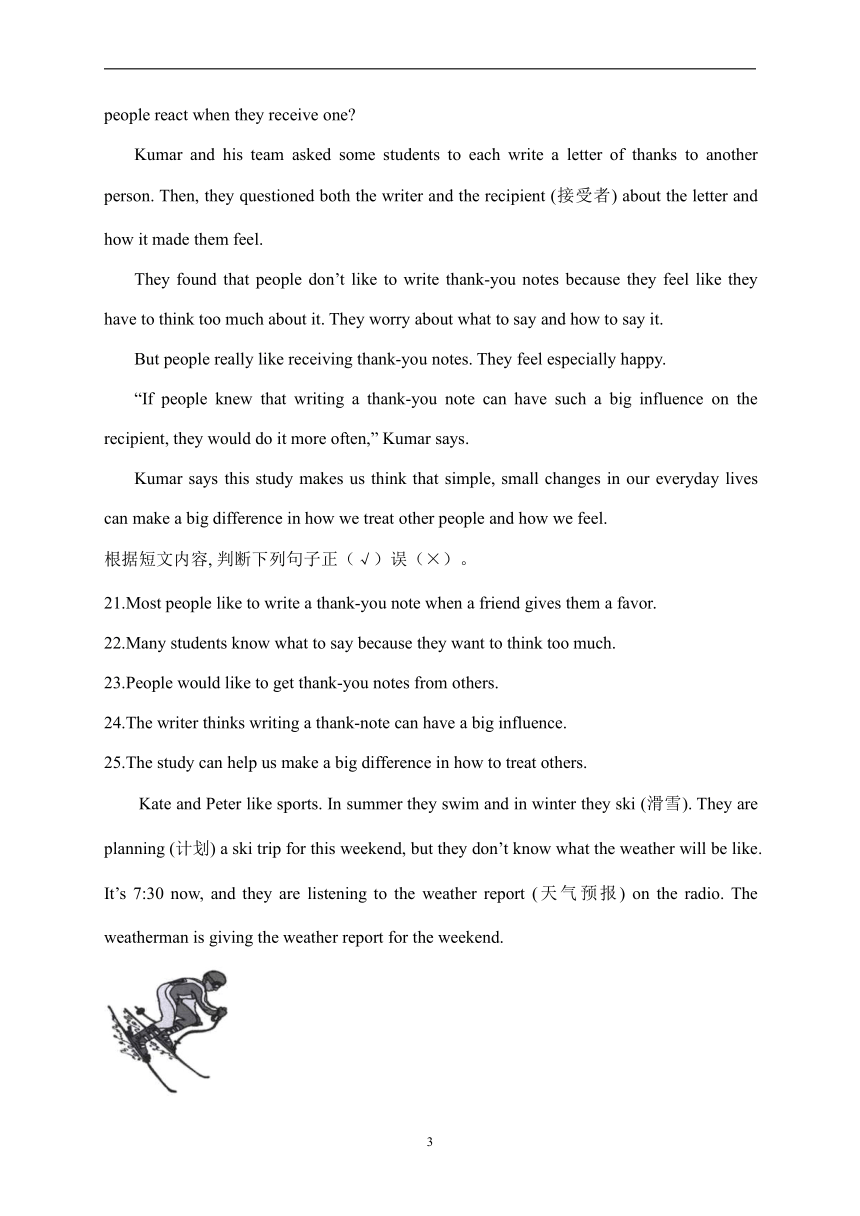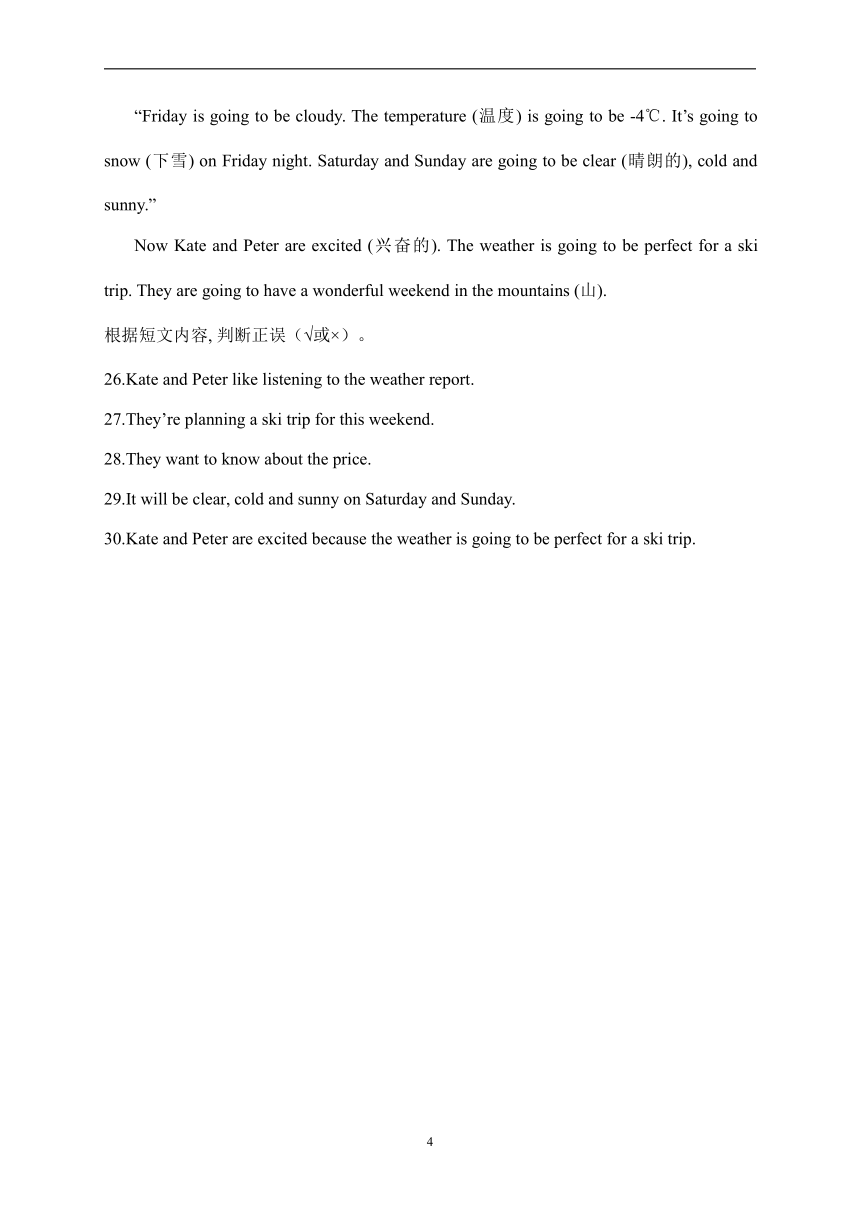2023届中考英语高频考点专项练习:专题三 考点04 冠词(A卷)(含答案)
文档属性
| 名称 | 2023届中考英语高频考点专项练习:专题三 考点04 冠词(A卷)(含答案) |  | |
| 格式 | docx | ||
| 文件大小 | 55.9KB | ||
| 资源类型 | 教案 | ||
| 版本资源 | 通用版 | ||
| 科目 | 英语 | ||
| 更新时间 | 2022-12-16 09:26:05 | ||
图片预览




文档简介
专题三 考点04 冠词(A卷)
一、单选
1.—Do you know the young man in blue
—Yes, he is _____ university student and plays _____ part in helping the poor children here.
A. a; a B. an; a C. a; / D. an; /
2.—What a nice dress!
—That's for sure. My mother is _____ expert at making dresses.
A. the B. an C. a D./
3.—Are you going to play _____ baseball this weekend
—No. I'm going to play _____ tennis with David.
A. the; the B. the; / C. / ; / D. / ; the
4.I lost (丢失)_____ ruler and _____ ID card. I must find them.
A. a; a B. an; a C. an; an D. a; an
5.—Is your brother _____ university student
—Yes, he studies math and he is going to be _____ engineer.
A. an; an B. an; a C. a; a D. a; an
6.I usually have ______ egg and some bread for breakfast.
A.a B.an C.the D./
7.I have _____ eraser and five _____ in my pencil box.
A. a; pencils B. a; pencil C. an; pencils D. an; pencil
8.What do you think of _____ movie, Kate
—I think it is _____ educational one.
A. an; an B. the; an C. the; a D. a; the
9.—Tom is really _____ honest boy.
—Yes. That's why he is _____ most popular student in his class.
A. an; a B. an; the C. a; the D. the; /
10.I don't know the girl. I just know she is from _____ European country.
A. a B. an C. the D. /
11.Zhong Nanshan is not only _____ excellent doctor but also a brave fighter.
A. a B. an C. the D. /
12.As an old saying goes, "He who has never been to _____ Great Wall is not a true man."
A. a B. an C. the D. /
13.—What's the most important tradition in Chinese family
—I think it's to respect _____ old and love _____ young.
A. an; the B. an; a C. the; the D. a; the
14.Daqing is in _____ north of China and it has _____ population of more than 2.7 million.
A. a; a B. a; the C. the; a D.the; the
15.France is _____ European country, and I visited _____ country three years ago.
A. an; the B. a; the C. an; a D.the; the
16.I usually have _____ breakfast at 7 o'clock, and I had _____ big breakfast this morning.
A. /; a B. a; a C. /; the D.a; the
17.It is believed that taking the panda-themed tourist train to Zunyi is _____ enjoyable experience.
A. the B. an C. a D. /
18.—What do you think of _____ trip to Fenghuang Mountain
—Wonderful! We all had _____ good time.
A. the; a B. a; the C. a; a D. the; the
19.He is going to buy _____ useful book. And _____ book is on science.
A. a; an B. a; the C. an; an D. an; the
20.Locus usually has _____ egg and some milk for breakfast.
A. a B. an C. the D. /
二、阅读理解
If a friend helps you, what do you do in return You could just say “Thank you”. Or you could write a thank-you note. But most people don’t do this.
“People don’t seem to give thanks to people quite often,” Amit Kumar from University of Texas says.
Why are people hesitant (犹豫的) about sending thank-you notes And how do most people react when they receive one
Kumar and his team asked some students to each write a letter of thanks to another person. Then, they questioned both the writer and the recipient (接受者) about the letter and how it made them feel.
They found that people don’t like to write thank-you notes because they feel like they have to think too much about it. They worry about what to say and how to say it.
But people really like receiving thank-you notes. They feel especially happy.
“If people knew that writing a thank-you note can have such a big influence on the recipient, they would do it more often,” Kumar says.
Kumar says this study makes us think that simple, small changes in our everyday lives can make a big difference in how we treat other people and how we feel.
根据短文内容, 判断下列句子正(√)误(×)。
21.Most people like to write a thank-you note when a friend gives them a favor.
22.Many students know what to say because they want to think too much.
23.People would like to get thank-you notes from others.
24.The writer thinks writing a thank-note can have a big influence.
25.The study can help us make a big difference in how to treat others.
Kate and Peter like sports. In summer they swim and in winter they ski (滑雪). They are planning (计划) a ski trip for this weekend, but they don’t know what the weather will be like. It’s 7:30 now, and they are listening to the weather report (天气预报) on the radio. The weatherman is giving the weather report for the weekend.
“Friday is going to be cloudy. The temperature (温度) is going to be -4℃. It’s going to snow (下雪) on Friday night. Saturday and Sunday are going to be clear (晴朗的), cold and sunny.”
Now Kate and Peter are excited (兴奋的). The weather is going to be perfect for a ski trip. They are going to have a wonderful weekend in the mountains (山).
根据短文内容, 判断正误(√或×)。
26.Kate and Peter like listening to the weather report.
27.They’re planning a ski trip for this weekend.
28.They want to know about the price.
29.It will be clear, cold and sunny on Saturday and Sunday.
30.Kate and Peter are excited because the weather is going to be perfect for a ski trip.
答案以及解析
1.答案:A
解析:university是发音以辅音音素开头的名词,且此处是泛指,所以用不定冠词a; play a part in doing sth.意为“在做某事中发挥作用”,是固定结构。故选A项。
2.答案:B
解析:根据语境可知此处应用不定冠词表示泛指,故排除A项和D项; expert的发音以元音音素开头,故选B项。
3.答案:C
解析:play baseball意为“打棒球”,play tennis意为“打网球”,此时表示球类的名词前用零冠词。
4.答案:D
解析:两个空均表示泛指,ruler的发音以辅音音素开头,故第一个空应用不定冠词a; ID card的发音以元音音素开头,故第二个空用不定冠词an。
5.答案:D
解析:设空处均表示泛指。university的发音以辅音音素开头,故第一空用不定冠词a; engineer的发音以元音音素开头,故第二空用不定冠词an。故选D项。
6.答案:B
解析:本题考查冠词的用法。句意: 我早餐通常吃一个鸡蛋和一些面包。此处泛指"一个鸡蛋", 应用不定冠词, 且egg以元音音素开头, 故用不定冠词an。
7.答案:C
解析:第一个空后的名词eraser发音以元音音素开头, 应用不定冠词an; 第二个空前有five修饰, 应用pencils。
8.答案:B
解析:第一空特指这部电影,用定冠词the; 第二句话表示这是一部有教育意义的电影,设空处表示泛指,且educational的发音以元音音素开头,所以第二空应用不定冠词an。故选B项。
9.答案:B
解析:结合语境可知,第一空表示泛指,且honest的发音以元音音素开头,故应用不定冠词an。第二空后的形容词最高级most popular前应加the。故选B项。
10.答案:A
解析:句意为: 我不认识这个女孩。我只知道她来自一个欧洲国家。此处表示泛指, 因此用不定冠词。European的发音以辅音音素开头, 因此用不定冠词a。故选A项。
11.答案:B
解析:句意为: 钟南山不仅是一位优秀的医生, 还是一位勇敢的斗士。这里泛指一位优秀的医生, excellent的发音以元音音素开头, 故应用不定冠词an。故选B项。
12.答案:C
解析:the Great Wall意为"长城", 是专有名词, 故选C项。
13.答案:C
解析:句意为: —中国家庭最重要的传统是什么 —我认为是尊老爱幼。表示一类人应用"定冠词the+形容词"这一结构。
14.答案:C
解析:句意为: 大庆在中国的北部, 它有270多万的人口。in the north of意为"在......的北部", 指的是在某个范围的内部。have a population of...意为"有......人口", 为固定搭配。
15.答案:B
解析:句意为: 法国是一个欧洲国家, 三年前我参观过这个国家。第一空处表示泛指, 且European的发音以辅音音素开头, 故第一空用不定冠词a; 第二空表示特指, 应用定冠词the。
16.答案:A
解析:三餐前不加冠词; 在表示"一顿......的早餐"时, 形容词前加不定冠词a/an, big的发音以辅音音素开头, 故第二空用a。
17.答案:B
解析:experience在此处意为"经历; 体验", 为可数名词单数, 此处表示泛指, 应用不定冠词。enjoyable的发音以元音音素开头, 故用不定冠词an。
18.答案:A
解析:第一空特指去凤凰山的旅行, 应用定冠词the; have a good time意为"玩得开心", 是固定搭配。
19.答案:B
解析:第一空泛指"一本有用的书", 应用不定冠词, useful是发音以辅音音素开头的单词, 故第一空用a; 第二空特指前面提到的这本书, 应用定冠词the。
20.答案:B
解析:egg为可数名词单数, 此处泛指"一个鸡蛋", 应用不定冠词。egg是发音以元音音素开头的单词, 故用不定冠词an。
21.答案:×
解析:细节理解题。由短文第一段最后两句“But most people don’t do this.”可知大多数人不愿意写感谢信。该表述与文章内容不符。故答案为×。
22.答案:×
解析:细节理解题。由第五段内容“They found that people don’t like to write thank-you notes because they feel like they have to think too much about it.”可知, 他们发现人们不喜欢写感谢信, 因为他们觉得自己不得不考虑太多。而且他们也担心说什么和怎么说。该表述与文章内容不符。故答案为×。
23.答案:√
解析:细节理解题。由短文第六段内容“But people really like receiving thank-you notes.”可知, 人们真的很喜欢收到感谢信。该表述与文章内容相符。故答案为√。
24.答案:√
解析:细节理解题。由短文第七段内容“If people knew that writing a thank-you note can have such a big influence on the recipient...”可知感谢信能产生巨大的影响。该表述与文章内容相符。故答案为√。
25.答案:√
解析:细节理解题。由短文最后一段“...can make a big difference in how we treat other people and how we feel.”可推断, 作者认为这项调查可以帮助我们在如何对待他人方面做出很大的改变。该表述与文章内容相符。故答案为√。
26.答案:×
解析:细节理解题。根据“Kate and Peter like sports.”可知, 凯特和彼得喜欢运动, 而不是听天气预报, 故答案为×。
27.答案:√
解析:细节理解题。根据“They are planning (计划) a ski trip for this weekend”可知, 他们计划这周末去滑雪, 故答案为√。
28.答案:×
解析:细节理解题。根据“but they don’t know what the weather will be like.”可知, 他们想知道下周天气, 并没有提到想知道价钱, 故答案为×。
29.答案:√
解析:细节理解题。根据“Saturday and Sunday are going to be clear (晴朗的), cold and sunny.”可知, 周六和周日将是晴天, 寒冷而晴朗。故答案为√。
30.答案:√
解析:细节理解题。根据“Now Kate and Peter are excited (兴奋的). The weather is going to be perfect for a ski trip. ”可知, 凯特和彼得很兴奋因为天气将是滑雪旅行的最佳时机。故答案为√。
2
一、单选
1.—Do you know the young man in blue
—Yes, he is _____ university student and plays _____ part in helping the poor children here.
A. a; a B. an; a C. a; / D. an; /
2.—What a nice dress!
—That's for sure. My mother is _____ expert at making dresses.
A. the B. an C. a D./
3.—Are you going to play _____ baseball this weekend
—No. I'm going to play _____ tennis with David.
A. the; the B. the; / C. / ; / D. / ; the
4.I lost (丢失)_____ ruler and _____ ID card. I must find them.
A. a; a B. an; a C. an; an D. a; an
5.—Is your brother _____ university student
—Yes, he studies math and he is going to be _____ engineer.
A. an; an B. an; a C. a; a D. a; an
6.I usually have ______ egg and some bread for breakfast.
A.a B.an C.the D./
7.I have _____ eraser and five _____ in my pencil box.
A. a; pencils B. a; pencil C. an; pencils D. an; pencil
8.What do you think of _____ movie, Kate
—I think it is _____ educational one.
A. an; an B. the; an C. the; a D. a; the
9.—Tom is really _____ honest boy.
—Yes. That's why he is _____ most popular student in his class.
A. an; a B. an; the C. a; the D. the; /
10.I don't know the girl. I just know she is from _____ European country.
A. a B. an C. the D. /
11.Zhong Nanshan is not only _____ excellent doctor but also a brave fighter.
A. a B. an C. the D. /
12.As an old saying goes, "He who has never been to _____ Great Wall is not a true man."
A. a B. an C. the D. /
13.—What's the most important tradition in Chinese family
—I think it's to respect _____ old and love _____ young.
A. an; the B. an; a C. the; the D. a; the
14.Daqing is in _____ north of China and it has _____ population of more than 2.7 million.
A. a; a B. a; the C. the; a D.the; the
15.France is _____ European country, and I visited _____ country three years ago.
A. an; the B. a; the C. an; a D.the; the
16.I usually have _____ breakfast at 7 o'clock, and I had _____ big breakfast this morning.
A. /; a B. a; a C. /; the D.a; the
17.It is believed that taking the panda-themed tourist train to Zunyi is _____ enjoyable experience.
A. the B. an C. a D. /
18.—What do you think of _____ trip to Fenghuang Mountain
—Wonderful! We all had _____ good time.
A. the; a B. a; the C. a; a D. the; the
19.He is going to buy _____ useful book. And _____ book is on science.
A. a; an B. a; the C. an; an D. an; the
20.Locus usually has _____ egg and some milk for breakfast.
A. a B. an C. the D. /
二、阅读理解
If a friend helps you, what do you do in return You could just say “Thank you”. Or you could write a thank-you note. But most people don’t do this.
“People don’t seem to give thanks to people quite often,” Amit Kumar from University of Texas says.
Why are people hesitant (犹豫的) about sending thank-you notes And how do most people react when they receive one
Kumar and his team asked some students to each write a letter of thanks to another person. Then, they questioned both the writer and the recipient (接受者) about the letter and how it made them feel.
They found that people don’t like to write thank-you notes because they feel like they have to think too much about it. They worry about what to say and how to say it.
But people really like receiving thank-you notes. They feel especially happy.
“If people knew that writing a thank-you note can have such a big influence on the recipient, they would do it more often,” Kumar says.
Kumar says this study makes us think that simple, small changes in our everyday lives can make a big difference in how we treat other people and how we feel.
根据短文内容, 判断下列句子正(√)误(×)。
21.Most people like to write a thank-you note when a friend gives them a favor.
22.Many students know what to say because they want to think too much.
23.People would like to get thank-you notes from others.
24.The writer thinks writing a thank-note can have a big influence.
25.The study can help us make a big difference in how to treat others.
Kate and Peter like sports. In summer they swim and in winter they ski (滑雪). They are planning (计划) a ski trip for this weekend, but they don’t know what the weather will be like. It’s 7:30 now, and they are listening to the weather report (天气预报) on the radio. The weatherman is giving the weather report for the weekend.
“Friday is going to be cloudy. The temperature (温度) is going to be -4℃. It’s going to snow (下雪) on Friday night. Saturday and Sunday are going to be clear (晴朗的), cold and sunny.”
Now Kate and Peter are excited (兴奋的). The weather is going to be perfect for a ski trip. They are going to have a wonderful weekend in the mountains (山).
根据短文内容, 判断正误(√或×)。
26.Kate and Peter like listening to the weather report.
27.They’re planning a ski trip for this weekend.
28.They want to know about the price.
29.It will be clear, cold and sunny on Saturday and Sunday.
30.Kate and Peter are excited because the weather is going to be perfect for a ski trip.
答案以及解析
1.答案:A
解析:university是发音以辅音音素开头的名词,且此处是泛指,所以用不定冠词a; play a part in doing sth.意为“在做某事中发挥作用”,是固定结构。故选A项。
2.答案:B
解析:根据语境可知此处应用不定冠词表示泛指,故排除A项和D项; expert的发音以元音音素开头,故选B项。
3.答案:C
解析:play baseball意为“打棒球”,play tennis意为“打网球”,此时表示球类的名词前用零冠词。
4.答案:D
解析:两个空均表示泛指,ruler的发音以辅音音素开头,故第一个空应用不定冠词a; ID card的发音以元音音素开头,故第二个空用不定冠词an。
5.答案:D
解析:设空处均表示泛指。university的发音以辅音音素开头,故第一空用不定冠词a; engineer的发音以元音音素开头,故第二空用不定冠词an。故选D项。
6.答案:B
解析:本题考查冠词的用法。句意: 我早餐通常吃一个鸡蛋和一些面包。此处泛指"一个鸡蛋", 应用不定冠词, 且egg以元音音素开头, 故用不定冠词an。
7.答案:C
解析:第一个空后的名词eraser发音以元音音素开头, 应用不定冠词an; 第二个空前有five修饰, 应用pencils。
8.答案:B
解析:第一空特指这部电影,用定冠词the; 第二句话表示这是一部有教育意义的电影,设空处表示泛指,且educational的发音以元音音素开头,所以第二空应用不定冠词an。故选B项。
9.答案:B
解析:结合语境可知,第一空表示泛指,且honest的发音以元音音素开头,故应用不定冠词an。第二空后的形容词最高级most popular前应加the。故选B项。
10.答案:A
解析:句意为: 我不认识这个女孩。我只知道她来自一个欧洲国家。此处表示泛指, 因此用不定冠词。European的发音以辅音音素开头, 因此用不定冠词a。故选A项。
11.答案:B
解析:句意为: 钟南山不仅是一位优秀的医生, 还是一位勇敢的斗士。这里泛指一位优秀的医生, excellent的发音以元音音素开头, 故应用不定冠词an。故选B项。
12.答案:C
解析:the Great Wall意为"长城", 是专有名词, 故选C项。
13.答案:C
解析:句意为: —中国家庭最重要的传统是什么 —我认为是尊老爱幼。表示一类人应用"定冠词the+形容词"这一结构。
14.答案:C
解析:句意为: 大庆在中国的北部, 它有270多万的人口。in the north of意为"在......的北部", 指的是在某个范围的内部。have a population of...意为"有......人口", 为固定搭配。
15.答案:B
解析:句意为: 法国是一个欧洲国家, 三年前我参观过这个国家。第一空处表示泛指, 且European的发音以辅音音素开头, 故第一空用不定冠词a; 第二空表示特指, 应用定冠词the。
16.答案:A
解析:三餐前不加冠词; 在表示"一顿......的早餐"时, 形容词前加不定冠词a/an, big的发音以辅音音素开头, 故第二空用a。
17.答案:B
解析:experience在此处意为"经历; 体验", 为可数名词单数, 此处表示泛指, 应用不定冠词。enjoyable的发音以元音音素开头, 故用不定冠词an。
18.答案:A
解析:第一空特指去凤凰山的旅行, 应用定冠词the; have a good time意为"玩得开心", 是固定搭配。
19.答案:B
解析:第一空泛指"一本有用的书", 应用不定冠词, useful是发音以辅音音素开头的单词, 故第一空用a; 第二空特指前面提到的这本书, 应用定冠词the。
20.答案:B
解析:egg为可数名词单数, 此处泛指"一个鸡蛋", 应用不定冠词。egg是发音以元音音素开头的单词, 故用不定冠词an。
21.答案:×
解析:细节理解题。由短文第一段最后两句“But most people don’t do this.”可知大多数人不愿意写感谢信。该表述与文章内容不符。故答案为×。
22.答案:×
解析:细节理解题。由第五段内容“They found that people don’t like to write thank-you notes because they feel like they have to think too much about it.”可知, 他们发现人们不喜欢写感谢信, 因为他们觉得自己不得不考虑太多。而且他们也担心说什么和怎么说。该表述与文章内容不符。故答案为×。
23.答案:√
解析:细节理解题。由短文第六段内容“But people really like receiving thank-you notes.”可知, 人们真的很喜欢收到感谢信。该表述与文章内容相符。故答案为√。
24.答案:√
解析:细节理解题。由短文第七段内容“If people knew that writing a thank-you note can have such a big influence on the recipient...”可知感谢信能产生巨大的影响。该表述与文章内容相符。故答案为√。
25.答案:√
解析:细节理解题。由短文最后一段“...can make a big difference in how we treat other people and how we feel.”可推断, 作者认为这项调查可以帮助我们在如何对待他人方面做出很大的改变。该表述与文章内容相符。故答案为√。
26.答案:×
解析:细节理解题。根据“Kate and Peter like sports.”可知, 凯特和彼得喜欢运动, 而不是听天气预报, 故答案为×。
27.答案:√
解析:细节理解题。根据“They are planning (计划) a ski trip for this weekend”可知, 他们计划这周末去滑雪, 故答案为√。
28.答案:×
解析:细节理解题。根据“but they don’t know what the weather will be like.”可知, 他们想知道下周天气, 并没有提到想知道价钱, 故答案为×。
29.答案:√
解析:细节理解题。根据“Saturday and Sunday are going to be clear (晴朗的), cold and sunny.”可知, 周六和周日将是晴天, 寒冷而晴朗。故答案为√。
30.答案:√
解析:细节理解题。根据“Now Kate and Peter are excited (兴奋的). The weather is going to be perfect for a ski trip. ”可知, 凯特和彼得很兴奋因为天气将是滑雪旅行的最佳时机。故答案为√。
2
同课章节目录
- 词法
- 名词
- 动词和动词短语
- 动词语态
- 动词时态
- 助动词和情态动词
- 非谓语动词
- 冠词
- 代词
- 数词和量词
- 形容词副词及其比较等级
- 介词和介词短语
- 连词和感叹词
- 构词法
- 相似、相近词比较
- 句法
- 陈述句
- 一般疑问句和否定疑问句
- 特殊疑问句及选择疑问句
- 反意疑问句
- 存在句(There be句型)
- 宾语从句
- 定语从句
- 状语从句
- 主谓一致问题
- 简单句
- 并列句
- 复合句
- 主谓一致
- 主、表语从句
- 名词性从句
- 直接引语和间接引语
- 虚拟语气
- 感叹句
- 强调句
- 倒装句
- 祈使句
- 句子的成分
- 句子的分类
- 题型专区
- 单项选择部分
- 易错题
- 完形填空
- 阅读理解
- 词汇练习
- 听说训练
- 句型转换
- 补全对话
- 短文改错
- 翻译
- 书面表达
- 任务型阅读
- 语法填空
- 其他资料
